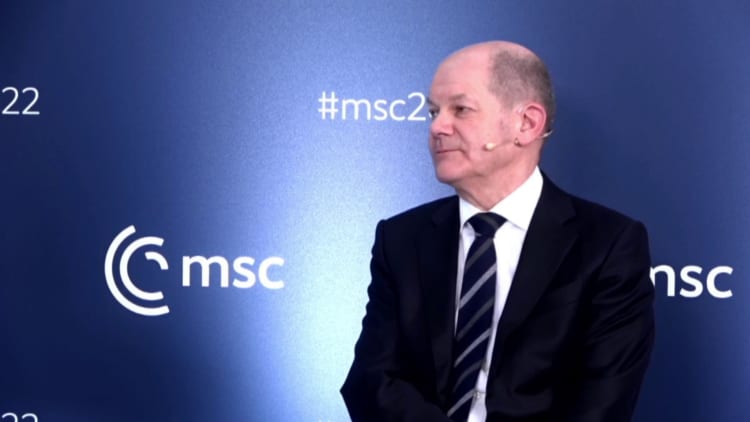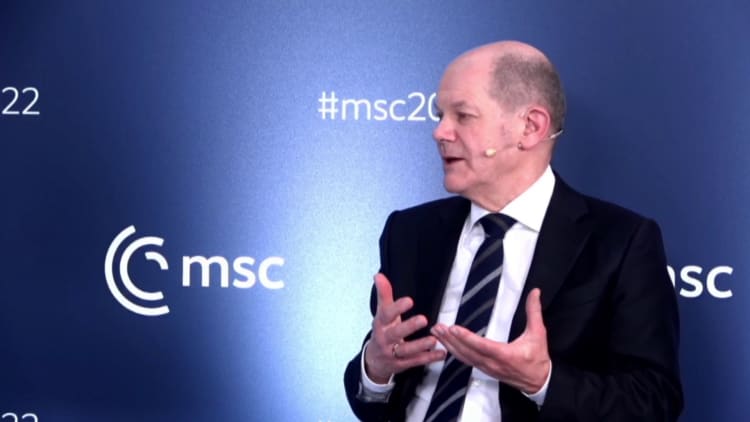
German Chancellor Olaf Scholz on Saturday rejected calls from Ukraine's president to sanction Russia now, saying that Moscow should not be sure "exactly" how the West will respond to a potential invasion.
Speaking to CNBC's Hadley Gamble at Germany's annual Munich Security Conference, Scholz said that Western allies were "well prepared" to sanction Russia — and quickly — if it were to invade Ukraine. But he said that such measures should remain a last resort in the hopes finding of a peaceful resolution to ongoing tensions.
"It's better to say we do it then, instead of doing it now, because we want to avoid the situation," he said, referring to imposing potential sanctions on Russia. "We want to go in the direction where peace is having a chance."
Russia has repeatedly denied that it is planning an invasion of Ukraine, but multiple Western officials said this week that the country is actively increasing its military presence on its border.
Scholz would not clarify what sanctions Russia might be hit with if it were to invade Ukraine. Rather, he said that Moscow ought to know "approximately" and not "exactly" the repercussions it would face.
The Russian government cannot be really sure exactly what we'll do.Olaf ScholzGerman chancellor
This contrasts with other Western leaders who have made specific remarks about how Russia could be hurt economically, most notably through energy sanctions.
"My view is that it makes no sense to make them public. It is good for what we expect to get that the Russian government cannot be really sure exactly what we'll do," he said.
"They will know approximately what we're talking about, but they will not know it exactly."

His comments come after Ukrainian President Volodymyr Zelensky on Saturday reiterated his calls for sanctions now, saying the West should stop its "appeasement" policy toward Russia.
"We have a right — a right to demand a shift from a policy of appeasement to one ensuring security and peace," Zelensky said at the Munich Security Conference.
"There is no such thing as 'this is not my war' in the 21st century. This is not about the war in Ukraine, this is about the war in Europe."
Russia launches ballistic and cruise missiles
In a show of its military prowess, Russia on Saturday launched ballistic and cruise missiles as part of a "planned exercise of the strategic deterrence forces."
President Joe Biden said Friday that the United States believes Russian President Vladimir Putin may carry out an attack on Ukraine "in the coming days."
"We have reason to believe the Russian forces are planning and intend to attack Ukraine in the coming week, in the coming days," Biden said Friday in remarks at the White House, noting that any such attack would likely target Ukraine's capital, Kyiv.
It comes after U.S. intelligence agencies said Moscow had added around 7,000 troops to Ukraine's border this week, taking its total estimated military presence to around 150,000. Russian forces have also been posted in Belarus, an ally that lies to the north of Ukraine.
Earlier this week, the Russian government claimed that it had started to return some of its troops to their bases. However, Ukraine's president and Western officials urged caution over taking Moscow's claim at face value.
Ukraine and Western allies have warned that Russia may create a "false flag" event — in which it would stage a real or simulated attack on its own forces — to create an excuse to invade Ukraine.
—CNBC's Natasha Turak contributed to this report.


